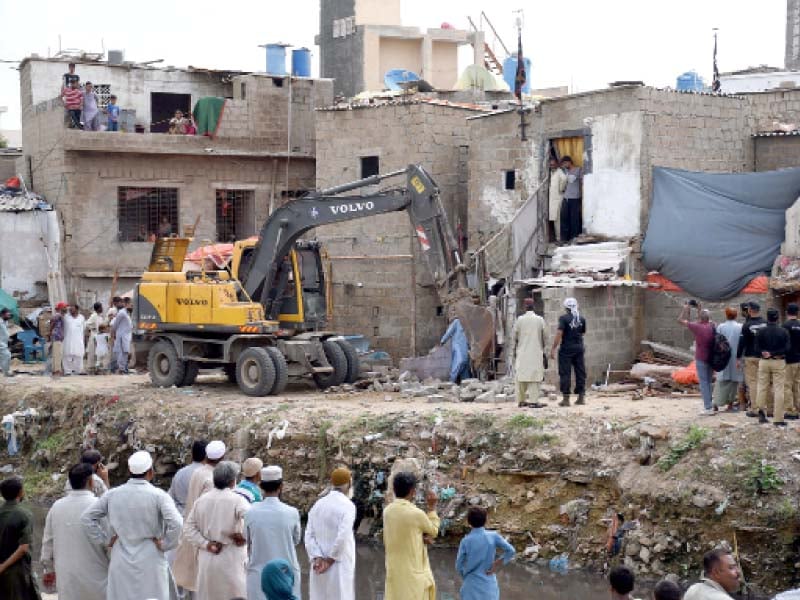Karachi Demolition Drive
KARACHI: The Sindh Cabinet has approved a grant-in-aid of Rs10.065 billion for the construction of 80-square-yard houses to accommodate 6,932 people whose homes were demolished during the clearance of Gujjar, Orangi, and Mahmoodabad nullahs in Karachi.
This decision is part of a broader initiative by the provincial government to rehabilitate those affected by the demolition drives aimed at clearing the city’s stormwater drains.
Earlier, the provincial government had allotted 258 acres of land in Taiser Town Scheme 45, under the Malir Development Authority, for the development of a housing scheme specifically for these displaced residents.
During the cabinet meeting chaired by Chief Minister Syed Murad Ali Shah, it was emphasized that the local government department should forward the revised PC-1, which outlines a budget of Rs4.621 billion.
This budget will cover the internal development of the designated area, including critical infrastructure like roads, water supply, sewerage, stormwater drainage, power supply, and a mosque. This revised proposal will now be sent to the planning and development department for approval.
The meeting highlighted that the Pakistan Engineering Council (PEC) had estimated the per-house cost to be Rs1,450,000. The PEC also provided a phased funding schedule: Rs500,000 at the commencement of construction, another Rs500,000 upon completion of masonry work up to the roof level, and Rs450,000 upon completing the grey structure for finishing work.
The cabinet gave principal approval for this tentative budget, although the final list of beneficiaries will be verified by a focal person as per the Supreme Court’s directive. The commissioner of Karachi was tasked with disbursing the funds according to the PEC’s schedule.
Additionally, the cabinet addressed the urgent need for infrastructure upgrades at the Jamila Sewerage Pumping Station, which was originally built in 1880 and is now overwhelmed by the sewerage load from the old city area and Lyari Town.
The cabinet approved Rs200 million for emergency rectification works to enhance the station’s capacity and ensure long-term relief for the residents of these areas.
In another significant decision, the cabinet discussed the rehabilitation of the existing Hub Canal and the construction of a new 100 MGD canal parallel to the existing one, with an estimated cost of Rs9.80 billion and Rs2.92 billion respectively.
This project is crucial for ensuring a stable water supply to Karachi. Chief Minister Murad Ali Shah offered a grant-in-aid of Rs12.72 billion to the Karachi Water and Sewerage Corporation (KWSC), with the condition that the project be completed by September 2025.
The cabinet also approved the establishment of the Sindh Electric Power Regulatory Authority (SEPRA) under the Sindh Regulation of Electric Power Services Act, 2023.
SEPRA will be a corporate body with a chairman and three members, overseeing technical, legal, corporate, and financial matters.
The CM allocated Rs197.916 million for SEPRA for the fiscal year 2024-25 and directed the energy minister to appoint the chairman and members in accordance with the law.
In a separate decision, the cabinet was informed that Pakistan Railways requested 1,381.34 acres of land in the Mirpurkhas Division for laying a 105-km railway line from Islamkot to Thar Coal Field and Chhor, as well as 30 acres in Karachi Division for a 9-km line from Bin Qasim to Port Qasim. This railway line will facilitate coal transport from Thar Coal Field to power projects and upcountry.
Finally, the cabinet approved the allotment of 1,462 acres for three solar power parks in Jamshoro, West Karachi, and Malir districts under the Sindh Solar Energy Project (SSEP), supported by the World Bank.
However, the CM refused a duty exemption request from the energy department, insisting that all departments and individuals must pay taxes.
Additionally, 40 acres in Korangi were allotted for the establishment of the Sindh Institute of Cardiovascular Diseases (SICVD).
I am a dynamic professional, specializing in Peace and Conflict Studies, Conflict Management and Resolution, and International Relations. My expertise is particularly focused on South Asian Conflicts and the intricacies of the Indian Ocean and Asia Pacific Politics. With my skills as a Content Writer, I serve as a bridge between academia and the public, translating complex global issues into accessible narratives. My passion for fostering understanding and cooperation on the national and international stage drives me to make meaningful contributions to peace and global discourse.










